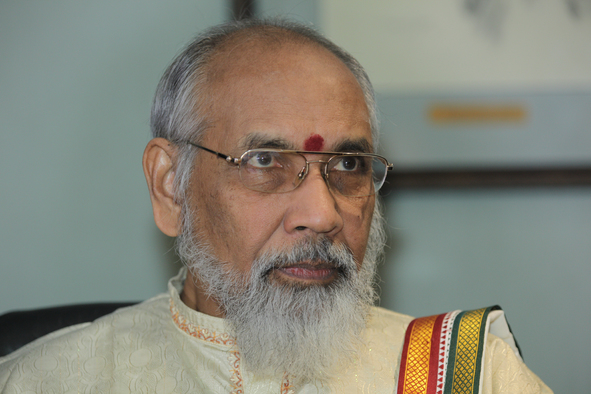Colombo, February 4 (newsin.asia): The former Chief Minister of Sri Lanka’s Tamil-majority Norther Province and presently leader of the Tamizh Makkal Koottanii (TMK) C.V.Wigneswaran has said that he will make efforts to contact the UN Secretary General Antonio Guterres to get him to intervene to secure the Tamils’ rights in Sri Lanka.
Elucidating his stand on the Tamils’ observance of Sri Lanka’s Independence Day on Monday as “Black Day”, Wigneswaran said: “The period allotted to Sri Lanka by Resolution 34/1 of the UN Human Rights’ Council for implementation will expire in March. In 2015 further 2 years’ time was given to implement the original Resolution 30/1. Next month this matter is to be taken up in Geneva for review. This resolution was important in our agitation for the resolution of our conflict and in our search for Justice. No tangible progress has been made so far by Sri Lanka. We need to work towards the International community using its pressure on the Sri Lankan Government.”
“It is time to take this matter before the Secretary-General of the UN. We need an independent International Mechanism to investigate the war crimes committed by Sri Lanka. We must agitate for such a mechanism. We should seek the support of the Secretary-General to comply with provisions which relate to obligations imposed on the International Community through General Assembly Resolution 60/147 to act under the authority of chapter VII of the UN Charter.”
“We need to submit a Resolution ourselves in this regard to be brought to the notice of the Secretary-General of the UN. I intend taking such steps through the Tamil Peoples’ Council (TPC). I would be contacting Messrs Gajendrakumar, Suresh Premachandran, Ayngaranesan and Ms.Ananthy Sasitharan and others in this regard.”
Going back into history to make a case for the Tamils’ right to self-determination, Wigneswaran said: “From pre-British times various units of people had separate kingdoms for themselves preserving their individual languages, culture, heritage, fine arts and ways of life. The British for administrative reasons centralized all those units during their period and brought them under their authority. In time this centralization gave way to repression of civil liberties and civil wars in many Asian and African Countries. Many such groups which were subject to repression and exploitation during colonial times expected freedom when the British left them. But that was not to be. Our story too is that.”
“After Independence was granted (to Sri Lanka) by the British in 1948 the repression, exploitation and refusal to grant our legitimate rights continued even in a more virulent manner within this Island. That is why we have decided to show our disapproval and negative feelings in a democratic, peaceful manner proclaiming today’s so called Independence Day as a day of mourning.”
“An Independence Day should be celebrated by a people who obtained freedom. Not by groups of people who have been subjected to further repression, discrimination, exploitation and hegemonic domination after the British left. If under the present circumstances we were to celebrate Independence it would mean we are being forced and/or pressured to do so. That the Armed Forces in large numbers still residing among us have compelled us to do so.”
“We must realize that many communities and groups of people all over the world who were affected by British Colonialism have resorted to such “Black Day” demonstrations, the world over.”
“If we investigate the causes that led to such repression by our indigenous governments we would find that the Kandyan Kingdom which was the last to fall to the British and which existed from the 14th Century up to February 1815, was ruled by South Indian Nayakar Kings. These (Hindu) kings in order to keep their authority in tact diplomatically converted themselves to Buddhism. After the British left us, those who became our Governors General and Sinhala Leaders many were descendants of these Nayakars, in order to retain their political authority resorted to racial discrimination.”
“This led to an unprecedented schism among the Tamils and the Sinhalese. It led to blood baths. Continuous acts of genocide were perpetrated against the Tamils. Thousands of Tamils have been missing. Our lands have been seized and continue to be seized. Our resources are being exploited. Tamils have been deprived of running their affairs by themselves.”

“Having seized our lands and rights the successive Sri Lankan Governments are bargaining with us to release just a few of them. Some of our erudite members of the Tamil National Alliance (TNA) are saying do not annoy the Government! But the relatives of the disappeared and our University Students have understood the situation and have come forward to declare the Independence Day as a Day of Mourning.”
“It pleases us to see their concern and enthusiasm. They give us hope. Unlike our erstwhile Tamil leaders, our people now seem to have woken up to reality.”
“Even in Keppapilavu, demonstrations are taking place today. The Keppapilavu people have with dedication been fighting for the release of their lands from the military. Their doggedness is to be lauded. Their fight would definitely be successful. I am in touch with them. A member from among them met me even yesterday. I hope to visit them soon.”
(The featured image at the top shows former Northern Province Chief Minister C.V.Wigneswaran)



























































